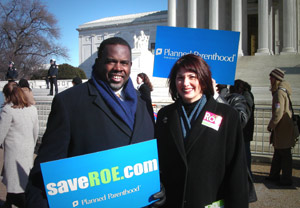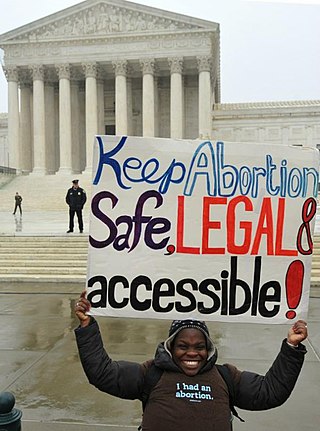
The United States abortion-rights movement is a sociopolitical movement in the United States supporting the view that a woman should have the legal right to an elective abortion, meaning the right to terminate her pregnancy, and is part of a broader global abortion-rights movement. The movement consists of a variety of organizations, with no single centralized decision-making body.

The March for Women's Lives was a protest demonstration held on April 25, 2004 at the National Mall in Washington, D. C. There was approximately 1.3 million participants. The demonstration was led by seven groups; National Organization for Women, American Civil Liberties Union, Black Women’s Health Imperative, Feminist Majority, NARAL Pro Choice America, National Latina Institute for Reproductive Health, and Planned Parenthood Federation of America. The march was intended to address topics such as abortion rights, reproductive health care, women's rights, and others. Originally named the March for Freedom, the march was renamed in an effort to expand the message of "pro-choice" to include the right to have children, access to pre and post natal care, as well as sex education that were not always accessible for women of color.
Byllye Yvonne Avery is an American health care activist. A proponent of reproductive justice, Avery has worked to develop healthcare services and education that address black women's mental and physical health stressors. She is best known as the founder of the National Black Women's Health Project, the first national organization to specialize in Black women's reproductive health issues. For her work with the NBWHP, she has received the MacArthur Foundation's Fellowship for Social Contribution and the Gustav O. Lienhard Award for the Advancement of Health Care from the Institute of Medicine of the National Academy of Sciences, among other awards.
The Chicago Women's Liberation Union (CWLU) was an American feminist organization founded in 1969 at a conference in Palatine, Illinois.
Unite for Reproductive & Gender Equity (URGE) is a national youth-led reproductive rights and justice non-profit organization in the United States based in Washington, D.C. that began as Choice USA in 1992. Choice USA changed its name to URGE in July 2014.

Reproductive justice is a critical feminist framework that was invented as a response to United States reproductive politics. The three core values of reproductive justice are the right to have a child, the right to not have a child, and the right to parent a child or children in safe and healthy environments. The framework moves women's reproductive rights past a legal and political debate to incorporate the economic, social, and health factors that impact women's reproductive choices and decision-making ability.

The National Women's Conference of 1977 was a four-day event during November 18–21, 1977, as organized by the National Commission on the Observance of International Women's Year. The conference drew around 2,000 delegates along with 15,000-20,000 observers in Houston, Texas, United States. The United States Congress approved $5 million in public appropriations for both the state and national conferences as HR 9924, sponsored by Congresswoman Patsy Mink, which Ford signed into law. In 1977 at the start of his presidency, President Jimmy Carter chose a new Commission and appointed Congresswoman Bella Abzug to head it. Numerous events were held over the next two years, culminating in the National Women's Conference.
The Feminist Women's Health Center of Atlanta is a feminist health center that provides comprehensive gynecological health care, engages in community outreach, and advocates for reproductive justice. Kwajelyn Jackson has served as the executive director since 2018.
African Americans', or Black Americans', access and use of birth control are central to many social, political, cultural and economic issues in the United States. Birth control policies in place during American slavery and the Jim Crow era highly influenced Black attitudes toward reproductive management methods. Other factors include African-American attitudes towards family, sex and reproduction, religious views, social support structures, black culture, and movements towards bodily autonomy.
The Native American Women's Health Education Resource Center (NAWHERC) is a nonprofit organization that provides health resources to Native American women and also advocates for women's health, reproductive choices, economic issues and land and water rights. NAWHERC is first organization dedicated to women's health to open up on an Indian Reservation in the United States. Its agenda is "consistently broad" because NAWHERC does not separate women's issues from community issues.

Loretta J. Ross is an American academic, feminist, and activist who advocates for reproductive justice, especially among women of color. As an activist, Ross has written on reproductive justice activism and the history of African American women.
Monica Simpson is a queer Black activist, artist, and executive director of SisterSong Women of Color Reproductive Justice Collective, the United States' largest organization dedicated to reproductive justice for women of color.
The SisterSong Women of Color Reproductive Justice Collective, also known as SisterSong, is a national activist organization dedicated to reproductive justice for women of color.
Luz Rodriguez is a Puerto Rican reproductive rights advocate.
Abortion in Illinois is legal up to the point of fetal viability. Laws about abortion dated to the early 1800s in Illinois; the first criminal penalties related to abortion were imposed in 1827, and abortion itself became illegal in 1867. As hospitals set up barriers in the 1950s, the number of therapeutic abortions declined. Following Roe v. Wade in 1973, Illinois passed a number of restrictions on abortion, many of which have subsequently been repealed. Illinois updated its existing abortion laws in June 2019. The state has seen a decline in the number of abortion clinics over the years, going from 58 in 1982 to 47 in 1992 to 24 in 2014.
Mia Mingus is an American writer, educator, and community organizer who focuses on issues of disability justice. She is known for coining the term "access intimacy". She advocates for disability studies and activism to centralize the experiences of marginalized people within disability organizing. She is a prison abolitionist, and she advocates for transformative justice in her work against child sexual abuse.
The National Latina Institute for Reproductive Justice is a reproductive justice organization representing the Latina community living in the United States. Previously the National Latina Institute for Reproductive Health, the organization started as The Latina Initiative, which was created in direct response to the lack of Latina visibility on reproductive health and rights issues. Its mission is to ensure the fundamental human right to reproductive health for Latinas, their families and their communities through education, advocacy and coalition building.
Flora Rodríguez Russel was a social worker and attorney in Denver, Colorado. She championed reproductive justice and children's rights.
COLOR Latina is a reproductive justice organization in Colorado.
Luz Alvarez Martinez is an American activist and leader in the movement for reproductive justice. She co-founded the National Latina Health Organization, the first national feminist health organization for Latinas in the United States, in 1986. She was an early supporter of the United Farm Workers, and a feminist and environmentalist.





